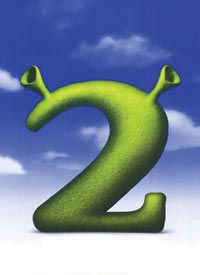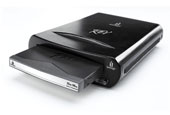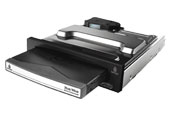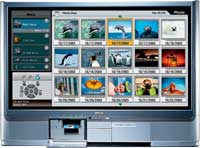




| 2004-June-25 Microsoft will increase the storage limit for its free e-mail service from 2 MB to 250 MB, with the limit for attachments growing to 10 MB. In addition, MSN will now scan and automatically clean all incoming and outgoing e-mail for viruses and worms.
2004-June-23 Spam now accounts for up to 83 percent of all e-mail traffic, costing Internet providers roughly $500 million each year in wasted bandwidth, legal bills and additional customer-service costs. This prompted some of the world's largest e-mail providers to propose new ways to authenticate e-mail so that Internet users can be sure of the origins of the messages that they receive. Officials from America Online, EarthLink, Microsoft, Yahoo, Comcast and British Telecom announced the proposals on Tuesday, along with 21 recommendations for Internet and e-mail service providers, online direct marketers and the public on how to reduce the amount of spam online. One of them suggests cutting off Internet users whose computers are sending large amounts of spam, while another recommends limiting the amount of e-mails sent every day. They plan to release their findings later this year.
2004-June-20 Yahoo has begun offering 100MB of email storage to its existing account members in response to Google's GMail's threat. Yahoo used to offer only 4MB of free email storage and charged $60.00 for 100MB of storage few months ago. The attached file size has also been increased on Yahoo's part from previous 3MB to 10MB. The company will now offer a new plan, in which it will offer 2GB of storage for $20.00 per year. The space will not only be doubled, but Yahoo will add numerous features that Google's GMail doesn't offer. One of them being the ability to download email via any email program. Microsoft, while trying to compete, hasn't raised the bar too much. The company has upgraded some free Hotmail accounts to 25MB from 2MB. The software maker still offers two paid plans that include - $40.00 per year for 50MB of storage and $60.00 for 100MB of storage.
2004-June-7 Microsoft's customers who purchased the company's Software Assuarance for Windows Server software family of products can now install additional copies of the assured software for free, provided the software is installed on computers are kept off until they are needed. The new software licensing feature is meant for backup computers used for disaster recovery.
2004-June-3 Intel and AMD have both announced new processors. AMD's Athlon 64 FX-53 and Athlon 64 processors 3800+, 3700+ and 3500+ processors feature the Enhanced Virus Protection (EVP) capability for desktop and mobile computing when enabled by the upcoming Windows XP Service Pack 2. In turn, Intel announces three new Pentium 4 chips - model 538, 532 and 518 - that support hyperthreading, 1MB of Level 2 cache and 13 new multimedia performance improvement instructions, and a mobile Celeron chip with 512k L2 Cache.
2004-May-28 Yahoo! has added a beta spyware detector for its downloadable toolbar. The detector, called 'Anti-Spy', is a stripped down version of PestPatrol's free anti-spyware software; it will allow users to scan their computers for unwanted spyware. Spyware is defined as software that secretly monitors the user's activities, gathers personal information and delivers unwanted popup ads. It is most frequently secretly introduced into a users' system through peer-to-peer networking software or piggybacks on downloaded files. EarthLink and AOL had both introduced anti-spyware products earlier. At a Federal Trade Commission (FTC) spyware workshop last month, Microsoft announced it would include an "unsolicited download suppression tool" in the next XP service pack.
2004-May-19 It is estimated that 80% of all Internet traffic travels through devices made by Cisco Systems. Cisco uses its own operating system to power these devices, and on Tuesday, source code of this operating system was leaked to the Internet. Internetwork Operating System, or IOS, consists of many modules which underwent many revisions, handling anything from simple routing to complex VPN authentication. The leaked code appears to be directly from Cisco development server and was last updated in November 2003. The stolen code could be used to compromise Cisco devices. Cisco is working with FBI to investigate this incident, and we expect Cisco to release a series of updates to network administrator in the coming months.
2004-May-11 Am 18-year-old German was arrested for creating the 'Sasser' and 'NetSky' virus. The teenager said his original intention was to create a virus, now known as 'Netsky A', to combat the 'MyDoom' and 'Bagle' viruses by removing them from infected machines. With encouragement from his fellow students, he developed the 'Netsky' virus further, finally modifying it to create the 'Sasser' virus. Under German law, if he is convicted for computer sabotage, he could be jailed for up to five years.
2004-May-10 In a surprise move, Intel said it had cancelled development for 'Tejas' and 'Jayhawk', codenames for the successors to the Pentium 4 desktop and Pentium 4 Xeon processors. Instead, it will reposition the 'Dothan' chip as Pentium 4 replacement. 'Dothan' is the codename for the second-generation Pentium M microprocessor. In 2005, Intel is expected to lanuch its first two-core chip, codenamed 'Jonah', based on the 'Dothan' core.
2004-April-30 Police have arrested five people and seized three computers and other equipment in Lytham St Annes, Lancashire, UK. The accused were trying to steal customers' on-line banking account using emails to trick them into an official-looking website where the customers were instructed to give account details and credit card numbers. These type of attack, commonly referred to as "phishing", is on the rise. Smile, the Internet bank whose customers were targeted, said that a handful of the bank's 500,000 or so customers had given their details to a "bogus" site but no one is thought to have lost money. Online banks regularly post warnings on their websites saying that they never email customers asking them for their banking details.
2004-April-28 Hacking attacks, virus outbreaks, staff misuse and other network intrusions hit Britain's biggest firms at a rate of roughly one a week in 2003, the Department of Trade and Industry said in its annual report on Tuesday. More than two-thirds of all UK companies, including 91 percent of large organizations, reported a digital security breach of some kind last year, the DTI reported. The survey by the DTI and accountancy firm PwC revealed that the average UK business has roughly one security incident a month and larger ones suffer about one a week. Most businesses know there is a problem, PwC said, and virus writing gangs are getting more sophisticated. The average computer incident costs large companies £120,000 a time. The DTI’s information security breaches survey discovered that 74 per cent of all businesses and 94 per cent of large companies had an IT security incident in the past year, up from 44 per cent of all businesses in 2002 and just 24 per cent in 2000.
2004-April-23 United States FBI and agents from other countries carried out 120 searches in 27 US states and 10 countries starting Wednesday, US Attorney General John Ashcroft said. The countries were Belgium, Britain, Denmark, France, Germany, Hungary, Israel, the Netherlands, Singapore, Sweden. In Malaysia, the government's anti-piracy campaign, known as Tulen Patrol Campaign, had been expanded to cover key cities in the country. Tulen Patrol officers from the Enforcement Division have sent out direct mailers to 10,000 companies nationwide and will carry out their raids on these companies if original software has not been purchased to-date. The most frequently pirated business software in Malaysia are Microsoft Windows operating system and Microsoft Office productivity suite. If your companies had obtained these software in the past and they were not from Infoarch, please audit your license and ensure that they were not pirated. We have also supplied Linux and OpenOffice.org to some of our clients, these software are covered under the Public Document License, GNU General Public License, and/or the Sun Industry Standards Source License; they do not come with a license sticker. If your software is completely built by Infoarch, they are licensed by Infoarch to you. Please consult your Infoarch representative for further information.
2004-April-19 Hewlett-Packard announced at the National Association of Broadcasters' annual conference in Las Vegas that it had formed partnerships with Warner Bros. and DreamWorks. With Warner Bros., HP co-developed a software and services suite called the Digital Media Platform that enables studios to digitize all phases of film, television and video creation -- from storyboards through production and post production to moving content around the studio, archiving and restoration. HP and Warner Bros. used the new technology to restore movie classics.
The two companies also developed a system called virtual studio conferencing, which combines room-sized video screens, HP's remote 3-D software and DreamWorks' high-resolution imaging technology to facilitate collaboration between producers, directors and animators around the world. With these moves, HP is competing head-on with IBM who had replaced SGI as Hollywood's choice for production technology. HP hopes its entertainment strategy will also marginalize arch-rival Dell whose hardware is widely used throughout Hollywood. Dell is "interested but not capable" of deploying end-to-end hardware and software tools for Hollywood professionals. HP CEO Fiorina had said that Dell is "trapped" in the PC space.
2004-April-13 Two versions of the drives are available: USD400 for the external USB 2.0 unit, and USD380 for the internal ATAPI drive. The disks themselves are around USD60 each.
2004-April-2 Google is expected to announce a test version of a free e-mail service to about 1,000 users. In an attempt to beat back the advances of Yahoo and MSN, the e-mail service, called Gmail, will allow more storage space than the 2 megabytes that come with Microsoft’s Hotmail and 6 megabytes offered by Yahoo Mail. It includes technology that lets users search their messages for particular words or names. Google will help pay for the service by placing relevant ads in e-mail messages. The service is to become widely available in three to six months.
2004-March-29 In a move aimed to steer consumers away from the often misleading clock speed of a processor, Intel said it would begin to use a three digit code to indicate other performance indicators such as bus speed and cache size.
2004-March-27 TMNet and Jaring both suffered from unknown performance hit for the past three days. This affects their dial-up, ISDN, and Streamyx users.
2004-March-25 Microsoft unveils several new products in San Jose and San Francisco: 1. Microsoft Speech Server 2004, which will sell for USD8,000 or USD18,000 per CPU, depending on number of callers, is a software platform for networked computers that allows other software developers to take advantage of natural language recognition technology. 2. Microsoft Windows Mobile 2003 Second Edition, which is an updated version of its cell phone software. It adds features such as better screen management and resolution, as well as support for phones with built-in keyboards. 3. Microsoft XNA, which is an initiative to allow cross-platforms compatibility amongst Windows PC's, Xbox, and mobile hardware systems. On the same day, Microsoft was ordered by the European Commisison to pay a record 497 million euro (USD606,000,000) fine for violating EU antitrust law and to give competitors in audio-visual software and servers a fairer chance to compete.
2004-March-22 Johor Bahru experienced a severe thunder storm on March 21st, with many trees uprooted and power line interrupted. Due to the extended power outage, one of our gateways was taken off-line through Monday, leaving our other gateway congested. User who attempted to access our services would have experienced slow down as a result. Full service was restored by mid-day Monday.
2004-March-14 Yahoo announced its new search engine would use a system of paid inclusion for its database, charging websites as much as 49 dollars plus a per-click fee when users go to the site. Paying, however, does not guarantee a higher placement in search results. In a somewhat related news, Microsoft MSN Messanger and Hotmail services were down over the weekend, just as Microsoft was readying itself for the lanuch of its new search engine to compete with Yahoo and Google.
2004-March-12 Nine major computer and communications companies says they're applying for a mobile top-level domain (TLD) that would operate under a joint venture registry. Microsoft, Nokia, Vodafone, Hewlett-Packard, Hutchinson 3G UK, Samsung Electronics, Sun Microsystems, Orange SA and the GSM Association say they want to simplifying mobile subscribers' Internet experience and streamline the deployment of new sites aimed at mobile usage.
2004-February-19 With the acquisition of Overture for US$1.63 billion in 2003, Yahoo reorganized the research unit of Overture Services into Yahoo Research Labs this year, and announced it is jettisoning its use of Google's technology in favor of its own newly developed algorithmic Yahoo Search product. One new feature found in Yahoo's search technology is an integration layer between the search tool and the My Yahoo Web page. It works by adding links to XML/RSS site syndication content in search results, enabling users to search sites that support this format and add them to their personal homepages. Also, Yahoo Search is deploying antispam technology to filter out irrelevant, redundant or low-quality URLs and links. Once the conversion is complete -- it will take several weeks to switch its own Web sites and those of such partners as Microsoft -- half of all search queries in the United States will be powered by Yahoo, the company said.
2004-February-18 Intel CEO Craig Barrett announced that Intel will release new Xeon and Pentium 4 processors with 64-bit extensions technology. The first Intel chip to take advantage of the 64-bit extensions technology will be the next generation of the Xeon DP processors for workstations and low-end servers, code-named 'Nocona'. Nocona is scheduled for release in the second quarter. Future versions of both the Prescott processor and the Xeon MP processor will also include this technology. 'Prescott' is the core for existing Pentium 4 CPUs. Processors with 64-bit extension are different from Intel's 64-bit Itanium processor which uses a completely different instruction set. The 64-bit extended systems versions of Windows Server 2003 and Windows XP will support both 32-bit and 64-bit applications.
2004-February-14 Microsoft says parts of the source code from its Windows NT and Windows 2000 operating systems have leaked onto the Internet, possibly exposing its products to hackers and illicit copying. The code was spread across two 200MB files and appeared to come from an unidentified software developer with access to Microsoft's code. Software companies that create programs running on Windows need access to source code to build their own products. One main risk in having source code exposed to the public is the possibility that hackers could break into computers running Windows NT or Windows 2000 and destroy or steal data. UPDATE : A vulnerability has been found by studying Windows source code that was leaked, although it affects only Internet Explorer 5.01. The vulnerability allows an attacker to gain control over a user's computer by using a specially crafted bitmap file. When loaded using IE 5, the file will trigger an overflow error and allow the attacker to run arbitrary code on a victim's machine.
2004-February-10 Microsoft is scheduled to release Service Pack 2 for its Windows XP operating system in May 2004. Primarily a security fix, Service Pack 2 will include a much more capable Internet Connection Firewall, renamed Windows Firewall. Internet Explorer will include pop-up ad blocking and spyware detection. Both Outlook Express and Windows Messenger will now protect you from dangerous file types. Outlook Express has also been updated with a feature that prevent images download in HTML e-mail, thus preventing spammers from figuring out that your e-mail address is valid. After the release of the Service Pack, Microsoft is expected to announced the availability of a newer, cheaper, smaller version of Windows XP to compete with Linux.
2004-January-30 Microsoft is offering USD250,000 to anyone anywhere in the world who helps authorities find and prosecute the author of the "MyBoom.B" worm. The virus spread by e-mail, causes victims' PCs to launch an electronic attack against Microsoft's own website, and prevents victims from visiting the websites of leading antivirus companies. Microsoft said it will not pay rewards to anyone involved in creating the viruses. SCO Group, the company targeted by an earlier version of the same virus, previously offered a $250,000 reward for information leading to the arrest and conviction of the creator of the "MyDoom.A" version.
2004-January-8 Epson's Livingstation HDTV television sets can display still photos and produce high-quality prints of each shot, directly from inside the unit. The TV's also come with an external CD-R/RW drive that connects to the set through a USB port, allowing consumers to create an archive of their displayed photographs.
Microsoft wristwatch PDA will provide access to personalized channels of information, such as sports, weather, news, and to-do lists, and will be able to receive text messages via the company's proposed SPOT network (Smart Personal Object Technology). The watches must be recharged every few days.
2004-January-6 Advanced Micro Devices Inc. (AMD) is introducing its latest lineup of Athlon 64 processors for desktops, desktop-replacement notebooks, and smaller, more mobile notebooks. Several manufacturers, including Hewlett-Packard, Fujitsu Siemens Computers, and eMachines, plan to deliver PCs that run AMD's latest chips. AMD's goal with Athlon 64 is to create a consistent PC processor architecture that users can deploy for high-end and low-end computing needs. These 64-bit processors are backward compatible with existing 32-bit base code. They support SSE, SSE2, MMX™, 3DNow!™ technology and legacy x86 instructions, meaning they can run existing operating systems and drivers. In a related news, Intel said it had introduced a less expensive line of mobile chips, Celeron M. These processors are based on the same circuit design as Intel's Pentium M, but lack some features and will initially cost around 35 percent less.
2004-January-1 We will be performing a server software update on Sunday, 4 January 2004, 3:00PM-5:00PM. This is a planned update to improve server performance and functionality. Certain network services may be interrupted briefly during the update. Our electronic payment gateway will not be affected. |
|
 For
DreamWorks, HP provides a "utility rendering service" that allows filmmakers
to remotely access massive computing power from HP's Palo Alto headquarters for
complex animation tasks. DreamWorks used the service to create levels of detail
and complexity in the frames of Shrek 2, set for a May 21 release, that were impossible
in the first Shrek movie. Animators can render features like hair, skin, clothes
and water far more realistically, as well as increase the number of characters
inserted into a scene, by using the additional computing capacity.
For
DreamWorks, HP provides a "utility rendering service" that allows filmmakers
to remotely access massive computing power from HP's Palo Alto headquarters for
complex animation tasks. DreamWorks used the service to create levels of detail
and complexity in the frames of Shrek 2, set for a May 21 release, that were impossible
in the first Shrek movie. Animators can render features like hair, skin, clothes
and water far more realistically, as well as increase the number of characters
inserted into a scene, by using the additional computing capacity. Iomega
has begun selling its new removable hard drive, Rev, that provides 35GB of uncompressed
storage capacity with a 25Mbps transfer rate.
Iomega
has begun selling its new removable hard drive, Rev, that provides 35GB of uncompressed
storage capacity with a 25Mbps transfer rate. Each
1 x 0.8 x 0.8cm removable cartridge houses a 2.5in disk. Each disk contains its
own read/write head assembly and drive motor, allowing the unit to be sealed as
tightly as a regular hard drive. The company claimed Rev disks are estimated to
last 30 years, offering an error rate three times lower than that of today's sealed
hard drives.
Each
1 x 0.8 x 0.8cm removable cartridge houses a 2.5in disk. Each disk contains its
own read/write head assembly and drive motor, allowing the unit to be sealed as
tightly as a regular hard drive. The company claimed Rev disks are estimated to
last 30 years, offering an error rate three times lower than that of today's sealed
hard drives. Some
vendors familiar to PC users are introducing new consumer electronics at the 2004
International Consumer Electronics Show in Las Vegas.
Some
vendors familiar to PC users are introducing new consumer electronics at the 2004
International Consumer Electronics Show in Las Vegas. Measuring
3.6 by 2.0 by 0.5 inches, Apple's iPod Mini comes in five colours. It can hold
about 1,000 songs and can play for 8 to 10 hours on its battery per charge.
Measuring
3.6 by 2.0 by 0.5 inches, Apple's iPod Mini comes in five colours. It can hold
about 1,000 songs and can play for 8 to 10 hours on its battery per charge.